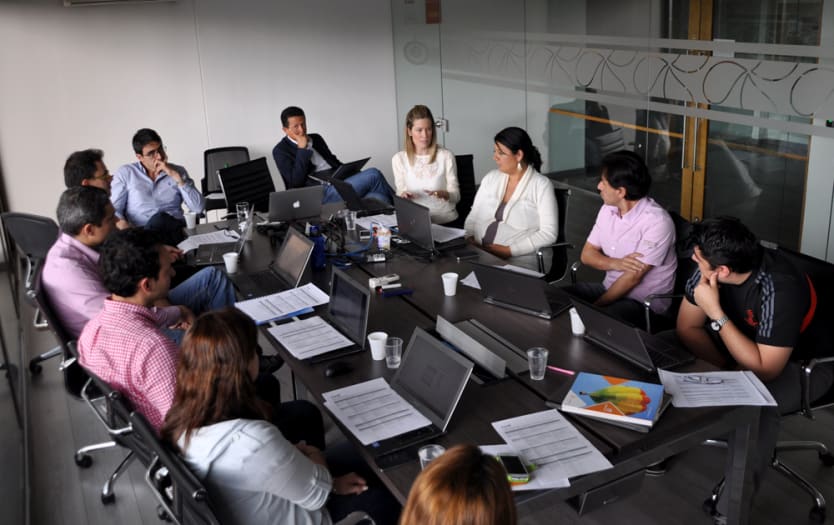
Ask any HR executive — skilled employees are one of the world’s most prized resources, and keeping the talent pipeline flowing is a vital task. But how can we close the skills gap and empower the next generation to succeed in the high-tech, fast-paced global workplace?
Like all large organizations, we need access to skilled people, and we’re committed to recruiting and developing them, but that isn’t enough. About a decade ago, we decided to go beyond recruitment and professional development: to actively help nurture talent in the communities where we live and work. As a pillar of our corporate responsibility strategy, we reach into our communities to help develop the next generation of business leaders, while developing our people through skills-based volunteering in the bargain.
Along the way, we’ve learned four lessons worth sharing.
1. Focus on strategic alignment.
To give your skills-based volunteering efforts true staying power, make sure they align with your corporate responsibility strategy as well as your overall business strategy. Take our EY Vantage program, which sends some of our most promising people to work with high-impact Latin American entrepreneurs.
The pro-bono efforts of our people help build the resilience of a burgeoning market by helping to empower the high-impact entrepreneurs who drive innovation and create jobs. Their communities and economies reap the benefits.
EY benefits too. The Vantage program supports our business strategy of being the leading Big Four firm in serving entrepreneurial high growth businesses by expanding our network of potential clients and elevating our brand. Our people benefit too. Future leaders get an invaluable global mobility experience that helps them develop a global mindset — something we consider an imperative in today’s business environment. They gain experience in an emerging market, where our clients’ growth potential is rising. Working in a different culture also encourages and enhances inclusive thinking.
2. Choose the right NGOs as partners.
Make sure that the NGO you partner with shares your values as well as your objectives. For the EY Vantage project, we work with Endeavor, a global nonprofit that seeks to transform emerging countries by supporting high-impact entrepreneurs, who get world-class strategic advice, access to key networks, and other tools to help them succeed. With that guidance, these entrepreneurs are jump-starting private sector development. They’re expanding employment, generating wealth and inspiring others to innovate. EY Vantage matches mid-career EY professionals with high-growth, emerging market entrepreneurial companies. We knew the program was likely to succeed because we understood Endeavor’s dedication to its task.
3. Use skills-based volunteering to build core skills.
Skills-based volunteering programs will gain the strong support of leadership if they are viewed as enhancing the skills that are most important to success on the job.
For example, EY places a premium on learning, especially for the thousands of young people we hire from college campuses every year. Our performance management and development process reflects our focus on mentoring, coaching and teaching, and we expect all our leaders to be accountable for developing others. The College Mentoring for Access and Persistence program is a natural outgrowth of that focus.
Teaming with non-profit organization College For Every Student, EY employees and partners who volunteer as College MAP mentors work with youth from low-income families to help them set their sights on higher education. The program currently operates in 24 cities across the United States and more cities are being added, helping to enhance our people’s core capabilities while contributing to a skilled workforce for the future.
A stretch volunteer assignment enhances our people’s leadership, communication and relationship-building skills. Whether it’s meeting the challenge of mentoring students in an underserved high school, our taking on the challenges that our EY Vantage Advisors face in helping emerging market entrepreneurs, skills-based volunteering is a way to develop leadership potential.
4. Stay dynamic.
Don’t rest on your laurels; keep looking for opportunities to innovate in terms of both internal and external strategies. We recently decided to maximize the value of two distinct but similar skills-based programs by bringing them together under the EY Vantage label. EY Vantage is operating on five continents, bringing additional impact and visibility to our work and to the value of entrepreneurship. We’ve also continued to develop College MAP, not only adding additional cities but also addressing another core need: financial aid. Through our scholarship fund, established on behalf of the College MAP graduating class of 2013 and repeated on behalf of the College MAP graduating class of 2014, combined with a generous match from the Ernst & Young Foundation, we are awarding more than $220,000 in scholarships to help the students we mentor.
Closing the skills gap
As a large global organization, we see huge opportunities to develop and harness talent — and we realize that failure to follow through on those opportunities would bring significant costs.
The challenge is helping individuals both inside and outside the firm build the skills they need to succeed. Closing the skills gap and empowering the next generation to succeed are integral elements of our corporate responsibility strategy and our business strategy as well as our purpose.
By doing our part to build a pipeline of business talent, we’re helping to sustain our firm — and to build a better working world.
The author will speak at the Public Private Partnership Forum at the Catalyzing Growth in Emerging Markets Conference on April 7-8 in Washington, D.C. Join the conversation online or by visiting pyxeraglobal.org, and follow on Twitter using the #Catalyze14 hashtag.








